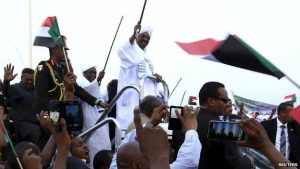People get busy, and it can be hard to keep up with the week’s news. To help you keep up with the latest news coming out of Africa, we will now compile a weekly list of the most important stories from think pieces, to opinion pieces to important developing stories. We hope it will be helpful in sorting out the important stuff in a world inundated with information and breaking headlines, and bring your attention to the issues that may not have gotten the most coverage during the week.
This week, we start off with a look at U.S. relationship building in Africa through investments, the larger implications of Goodluck Jonathan’s peaceful transition of power, and a controversial return.
1. Last month, Sarah Crozier wrote about the growing economic influence of African markets. Now, USA Today highlights the growing disparity between investment in Africa between China and the U.S. While the U.S. has significantly raised its investments to $14 billion in the continent, it pales to China’s behemoth investment of $75 billion in the past 10 years. There is, however, opportunity for the U.S. to create more meaningful relationships through the spread of democratic ideals, writes John Burnett.
2. President Goodluck Johnathan’s recent turnover of power to the elected Muhammadu Buhari stands as an example of the importance of transfers of power The New Yorker says. Phillip Gourevitch highlights several of the numerous African states where strongmen have refused to relinquish power, including Burkina Faso, The Democratic Republic of the Congo and Burundi. Meanwhile, Burundi has delayed its next vote until July 15, after a controversial bid for a third term by current President Pierre Nkurunziza.
3. Sudanese President Omar al-Bashir returned to Sudan this week, despite a South African court order under the International Criminal Court (ICC) that he stay in South Africa under investigation of war crimes. Sudan’s Foreign Minister Ibrahim Ghandour called the charges “lame and meaningless.” 4. African countries are exploring the opening of a free trade zone throughout the contient in effort to stimulate intra-continent trading and economic growth. However, many potential barriers still stand in the way of the vision, which states hope to see completed by 2017.

